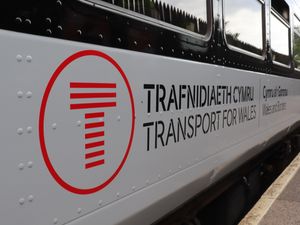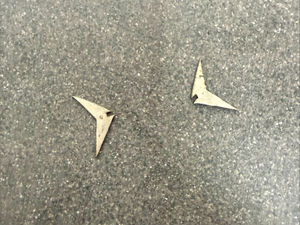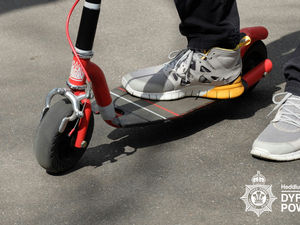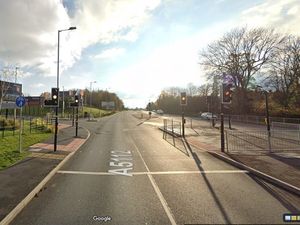Refs of road keep Shropshire traffic on the move
We are the referees. Sometimes we hand out yellow cards and sometimes they are red."
A team of just 12 parking enforcement officers are on patrol across the whole of Shropshire.
Their goal is to free up clogged streets and bays and keep traffic moving. And the opposition – motorists who flout the law.
The "gaffer" is Shropshire Council parking enforcement supervisor Shaun Sutton.
"We make the streets safer, we reduce the congestion and we try and make sure everyone gets a fair share of the highway when needed," he says.
The officers recently came under fire, in part, after one trader fired a parting shot at Shropshire Council, blaming its parking policies and the wardens for enforcing them for their decision to quit Shrewsbury.
Now Mr Sutton wants to put the record straight.
Without parking enforcement prior to 2006, Shropshire was a parking free-for-all, he says.
Cars would clog up streets, blocking dropped kerbs and fill up loading bays and bus lay-bys.
Mr Sutton said: "Shropshire had very little enforcement prior to that. All the loading bays were full, buses couldn't run properly and then we started. At the moment we have got 12 enforcement officers covering the whole of the county. Our job is to ensure that the traffic regulation orders are being complied with. If they are not being complied with we need to go there and get people to improve their behaviour."
Mr Sutton says some drivers who fail to heed the regulations often don't realise the impact they can have on others. He highlights the case of a distressed man who contacted officers when he was unable to get home.
The battery had gone flat on his motorised scooter as he made detour after detour due to dropped kerbs being blocked by people who had parked their cars across them.
He shows pictures of buses unable to get down streets because drivers have parked inconsiderately.
Now since officers have been monitoring the county's streets, the difference is huge, says Mr Sutton.
There are files stuffed full of thank you letters from members of the public. Bus drivers also wave to acknowledge officers, safe in the knowledge that they can now pull over where they need to.
And they in turn don't block the road, frustrating motorists stuck behind or blocking the road so emergency vehicles can't get through. Traders are also now able to load and unload in their designated loading bays without the fear of having to drive around and around waiting for a vehicle to move, says Mr Sutton. As well as routine streets patrols in town centres across Shropshire – Mr Sutton says they respond to "intelligence" from the public about specific problems.
"We have had some complaints about inconsiderate parking in Shrewsbury town centre in the evenings, with vehicles blocking some side roads and causing obstructions, so there will be some evening patrols taking place in the near future," says Mr Sutton.
The officers are also on the brink of being equipped with new state of the art CCTV badges. Moves to introduce them in Shropshire are imminent although they have yet to be finally approved.
As well as monitoring any offence, the badges, which are worn on the officer's lapel will also act as "personal protection for the officers", says Mr Sutton.
"It means that when a complaint comes in we can view the footage. We want a profession, fair, balanced and consistent service."
In Telford and Wrekin, there will not be wardens on the streets for at least another 18 months.
Telford & Wrekin Council intends to make an application to the Government for Civil Parking Enforcement powers across the borough – but highways bosses have admitted they are unlikely to make the bid before April 2014.
But in Shrewsbury, Chris Evans has been a parking enforcement officer for the last five years – a job he says he enjoys.
"I am not here to make it worse. I am here to make it better," he says as he patrols the streets of Shrewsbury.
Consistency is key says Mr Evans, and everyone who contravenes traffic regulations is given the same treatment. He says: "We allow every vehicle a 10-minute observation period – most authorities allow five minutes, so it is generous."
If in that 10 minutes, the motorist has returned to their vehicle, they are given a warning rather than a PCN – a parking charge notice.
In three hours monitoring the streets of Shrewsbury, he dishes out tickets to two drivers.
One had parked on a single yellow line against regulations, and without a blue badge showing, for longer than ten minutes. Another parked in a bus lay-by – a parking no-no and a straight red card. But many others were given advice on where to park and how long they were able to stay.
Mr Sutton insists the job of a parking enforcement officer is not to penalise, not to meet targets – but to ensure that the traffic flows smoothly throughout the county.
"We are just referees for the road.
"We are just trying to make the whole place better for everybody."




